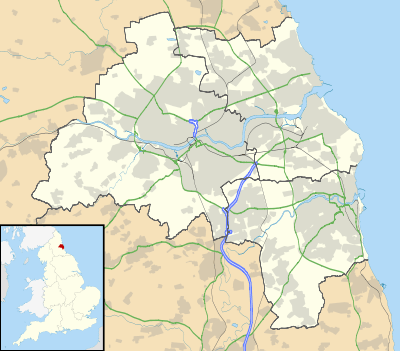Guildhall, Newcastle upon Tyne
| The Guildhall | |
|---|---|
 | |
| Location | Newcastle upon Tyne |
| Coordinates | 54°58′06″N 1°36′28″W / 54.96842°N 1.60767°WCoordinates: 54°58′06″N 1°36′28″W / 54.96842°N 1.60767°W |
| Built | 1655 |
| Architect | Robert Trollope |
Listed Building – Grade I | |
| Designated | 14 June, 1954 |
| Reference no. | 1120877 |
 Location of The Guildhall in Tyne and Wear | |
The Guildhall is an important civic building in Newcastle upon Tyne. It is a Grade I listed building.[1]
History
The building was designed by Robert Trollope and completed in 1655.[1] It replaced an earlier facility damaged by fire in 1639.[2] The frontage was rebuilt to designs by William Newton and David Stephenson in 1794.[1] The east end of the building is an extension designed by John Dobson and completed in 1823.[1] The south side is in a classical style and was designed by John and William Stokoe in 1809.[3] The main room is 92 feet long and 30 feet broad.[4] The mayor and sheriff were allowed to hold borough courts there.[5] It was also the meeting place of Newcastle Town Council[6] until 1863 when it re-located to Newcastle Town Hall in St Nicholas Square.[7]
See also
References
- 1 2 3 4 "The Guildhall and Merchants' Court". British Listed Buildings. Retrieved 30 September 2017.
- ↑ "Timeline: 1248 to 1967". Tyne and Wear Fire and Rescue Service. Retrieved 25 March 2018.
- ↑ "Newcastle, Sandhill, Guildhall | sitelines.newcastle.gov.uk". Twsitelines.info. Retrieved 2018-09-15.
- ↑ Mackenzie, Eneas (1827). "'Public buildings: The Exchange', in Historical Account of Newcastle-Upon-Tyne Including the Borough of Gateshead". Newcastle-upon-Tyne. pp. 215–218. Retrieved 30 September 2017.
- ↑ Middlebrook, Sydney (1950). Newcastle upon Tyne, Its Growth and Achievement. SR Publishers Ltd. ISBN 0-85409-523-3.
- ↑ Ford, Coreena (3 February 2016). "Café at Newcastle's Guildhall could be on the horizon as leisure entrepreneur makes plans". The Chronicle. Retrieved 24 March 2018.
- ↑ "Town Hall & Corn Market, Newcastle-upon-Tyne, England". Civil Engineer and Architect's Journal. 1 October 1858. p. 331.